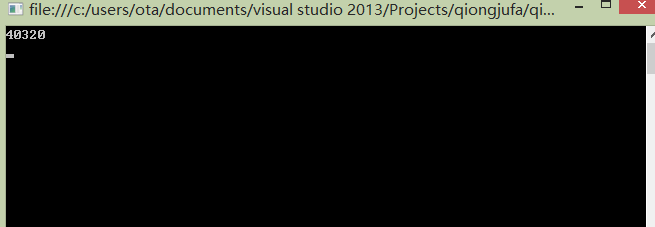从题目上看,这个感觉好绕口。其实嘛应该是我表述有问题。
举例吧:
1,[],1
2,[],[]2
这样子,两个相同数字之间要有几个坑。
其实这个数组计算量不算太大。推理能力好的话,分分钟解决了。
在这里我想通过程序去实现的目的:
1、为了空想这个实现过程,思想斗争了一晚上没睡觉,那种穷举方法比较好。其实我都没写过穷举。(--真是想太多)
2、了解下穷举算法。(我也不知道我下面写的方法算不算穷举。哈哈)
首先我们得有一个思路。【穷举出所有可能出现的排列方式=>规则匹配符合要求的数组 =>输出】
第一步:穷举
我的第一个错误的实现方法,我也写出来不怕丢人(嘿嘿)。那是这样的:
既然有八个位置。那么不考虑重复的情况下。(即默认它都是不相同的)
我们先定义八个字符串。
1 string[] strs = new string[8] { "x1", "x2", "x3", "x4", "x5", "x6", "x7", "x8" }; 2 string[] temp = new string[8]; 3 int x=0; 4 for (int i = 0; i < strs.Length; i++) 5 { 6 temp[0] = strs[i]; 7 for (int i1 = 0; i1 < strs.Length; i1++) 8 { 9 if (temp[0]!=strs[i1]) 10 { 11 temp[1] = strs[i1]; 12 for (int i2 = 0; i2 < strs.Length; i2++) 13 { 14 if (temp[0] != strs[i2]&&temp[1]!=strs[i2]) 15 { 16 temp[2] = strs[i2]; 17 for (int i3 = 0; i3 < strs.Length; i3++) 18 { 19 if (temp[0] != strs[i3] && temp[1] != strs[i3]&&temp[2]!=strs[i3]) 20 { 21 temp[3] = strs[i3]; 22 for (int i4 = 0; i4 < strs.Length; i4++) 23 { 24 if (temp[0] != strs[i4] && temp[1] != strs[i4] && temp[2] != strs[i4]&&temp[3]!=strs[i4]) 25 { 26 temp[4] = strs[i4]; 27 for (int i5 = 0; i5 < strs.Length; i5++) 28 { 29 if (temp[0] != strs[i5] && temp[1] != strs[i5] && temp[2] != strs[i5] && temp[3] != strs[i5]&&temp[4]!=strs[i5]) 30 { 31 temp[5] = strs[i5]; 32 for (int i6 = 0; i6 < strs.Length; i6++) 33 { 34 if (temp[0] != strs[i6] && temp[1] != strs[i6] && temp[2] != strs[i6] && temp[3] != strs[i6] && temp[4] != strs[i6]&&temp[5]!=strs[i6]) 35 { 36 temp[6] = strs[i6]; 37 for (int i7 = 0; i7 < strs.Length; i7++) 38 { 39 if (temp[0] != strs[i7] && temp[1] != strs[i7] && temp[2] != strs[i7] && temp[3] != strs[i7] && temp[4] != strs[i7] && temp[5] != strs[i7]&&temp[6]!=strs[i7]) 40 { 41 temp[7] = strs[i7]; 42 x++;//作为统计穷举次数 43 44 } 45 46 } 47 } 48 49 } 50 } 51 52 } 53 } 54 55 } 56 } 57 58 } 59 } 60 61 } 62 } 63 64 } 65 } 66 Console.WriteLine(x); 67 Console.ReadLine(); 68 }
血的教训告诉我们 8*7*6*5*4*3*2=40320
8*7*6*5*4*3*2=40320
我尝试过,如果每个字符串数组如果要输出的话,大概需要10分钟左右。更不要说,遍历每个字符串数组然后匹配规则,输出了。这才4个数字的,此方法直接扑街(pu gai)!
第二种方法。直接利用相同的数字去排除。然后穷举:
方法举例:假设第一种方法中的“x1”,“x2”是1那么在第二种方法中 x1,x3,x2 只算一个,在第一种方法中算至少两个。
这种方法直接将数组减少到
不多说直接上代码
 穷举方法二
穷举方法二
整整减少为原来的1/16.
第二步:规则匹配。在所有可能的数组中找出符合要求的数组
穷举完了,接下来就是规则匹配。
遍历数组。然后根据两个相同数在数组中的索引位置差的绝对值为该数值加1;
注意:要考虑到索引超出界限的问题!

1 public static bool IsYes(string[] str)
2 {
3 bool isYON = false;
4 List<string> intList =new List<string>();
5 for (int i = 0; i < str.Length; i++)
6 {
7 try
8 {
9
10 if (str[i] == str[i + Convert.ToInt32(str[i]) + 1] || str[i] == str[i - Convert.ToInt32(str[i]) - 1])
11 {
12 intList.Add(str[i]);
13 isYON = true;
14 }
15 else
16 {
17 return false;
18 }
19 }
20 catch (Exception)
21 {
22
23 if (str[i] == str[Math.Abs(i - Convert.ToInt32(str[i]) - 1)]&&intList.Contains(str[i]))
24 {
25 isYON = true;
26 }
27 else
28 {
29 return false;
30 }
31 }
32 }
33 return isYON;
34 }
这样。
这篇文章并没有什么很高的技术含量。反而还比较考验思路的连贯性。
文笔不好,表述有不到位的地方,还请各位多多见谅。
本人对算法基本上是一无所知。如果有好的对算法的学习方法还请不啬赐教。将不胜感激!
如果有更好的实现的方法,或者改进的方法可以在下面评论指出或者发送到我的邮箱 paul_0715 at sina dot com
